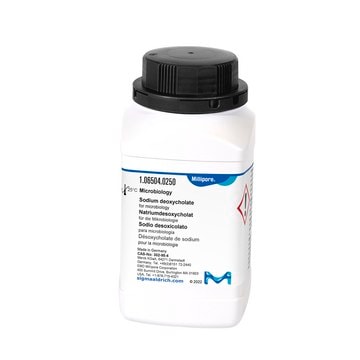30970
Sodium deoxycholate
BioXtra, ≥98.0% (dry matter, NT)
Synonym(s):
3α,12α-Dihydroxy-5β-cholanic acid sodium salt, 7-Deoxycholic acid sodium salt, Desoxycholic acid sodium salt
About This Item
Recommended Products
biological source
ox bile
Quality Level
description
anionic
product line
BioXtra
Assay
≥98.0% (dry matter, NT)
form
powder
optical activity
[α]20/D +44±2°, c = 2% in H2O
mol wt
micellar avg mol wt 1200-5000
aggregation number
3-12
technique(s)
DNA purification: suitable
RNA purification: suitable
electrophoresis: suitable
impurities
≤1% cholic acid (HPLC)
≤6% water
CMC
2-6 mM (20-25°C)
solubility
water: soluble 1 gm in 10 ml, clear, colorless to very faintly yellow
cation traces
Ca: ≤500 mg/kg
Cd: ≤5 mg/kg
Co: ≤5 mg/kg
Cr: ≤5 mg/kg
Cu: ≤5 mg/kg
Fe: ≤10 mg/kg
Mg: ≤10 mg/kg
Mn: ≤5 mg/kg
Ni: ≤5 mg/kg
Pb: ≤10 mg/kg
Zn: ≤5 mg/kg
HLB
16
functional group
carboxylic acid
SMILES string
[Na+].[H][C@]12CC[C@@]3([H])[C@]4([H])CC[C@H]([C@H](C)CCC([O-])=O)[C@@]4(C)[C@@H](O)C[C@]3([H])[C@@]1(C)CC[C@@H](O)C2
InChI
1S/C24H40O4.Na/c1-14(4-9-22(27)28)18-7-8-19-17-6-5-15-12-16(25)10-11-23(15,2)20(17)13-21(26)24(18,19)3;/h14-21,25-26H,4-13H2,1-3H3,(H,27,28);/q;+1/p-1/t14-,15-,16-,17+,18-,19+,20+,21+,23+,24-;/m1./s1
InChI key
FHHPUSMSKHSNKW-SMOYURAASA-M
Looking for similar products? Visit Product Comparison Guide
General description
Sodium Deoxycholate is also utilized in eluting buffers for affinity chromatography and plays a crucial role in DNA and RNA extraction from cells and tissues in molecular biology applications. Additionally, it is used as a catalyst in the preparation of protein extracts for immunoblotting and immunoprecipitation of radiolabeled proteins.
Application
Biochem/physiol Actions
Features and Benefits
- Suitable for Cell Biology and Biochemical Research
- Can be used in Electrophoresis, DNA and RNA purification
- Tested to confirm low levels of heavy metal contamination, ensuring suitability for various applications.
- High purity product for research applications
Other Notes
comparable product
Signal Word
Warning
Hazard Statements
Precautionary Statements
Hazard Classifications
Acute Tox. 4 Oral
Storage Class Code
11 - Combustible Solids
WGK
WGK 1
Flash Point(F)
Not applicable
Flash Point(C)
Not applicable
Personal Protective Equipment
Certificates of Analysis (COA)
Search for Certificates of Analysis (COA) by entering the products Lot/Batch Number. Lot and Batch Numbers can be found on a product’s label following the words ‘Lot’ or ‘Batch’.
Already Own This Product?
Find documentation for the products that you have recently purchased in the Document Library.
Customers Also Viewed
Our team of scientists has experience in all areas of research including Life Science, Material Science, Chemical Synthesis, Chromatography, Analytical and many others.
Contact Technical Service







